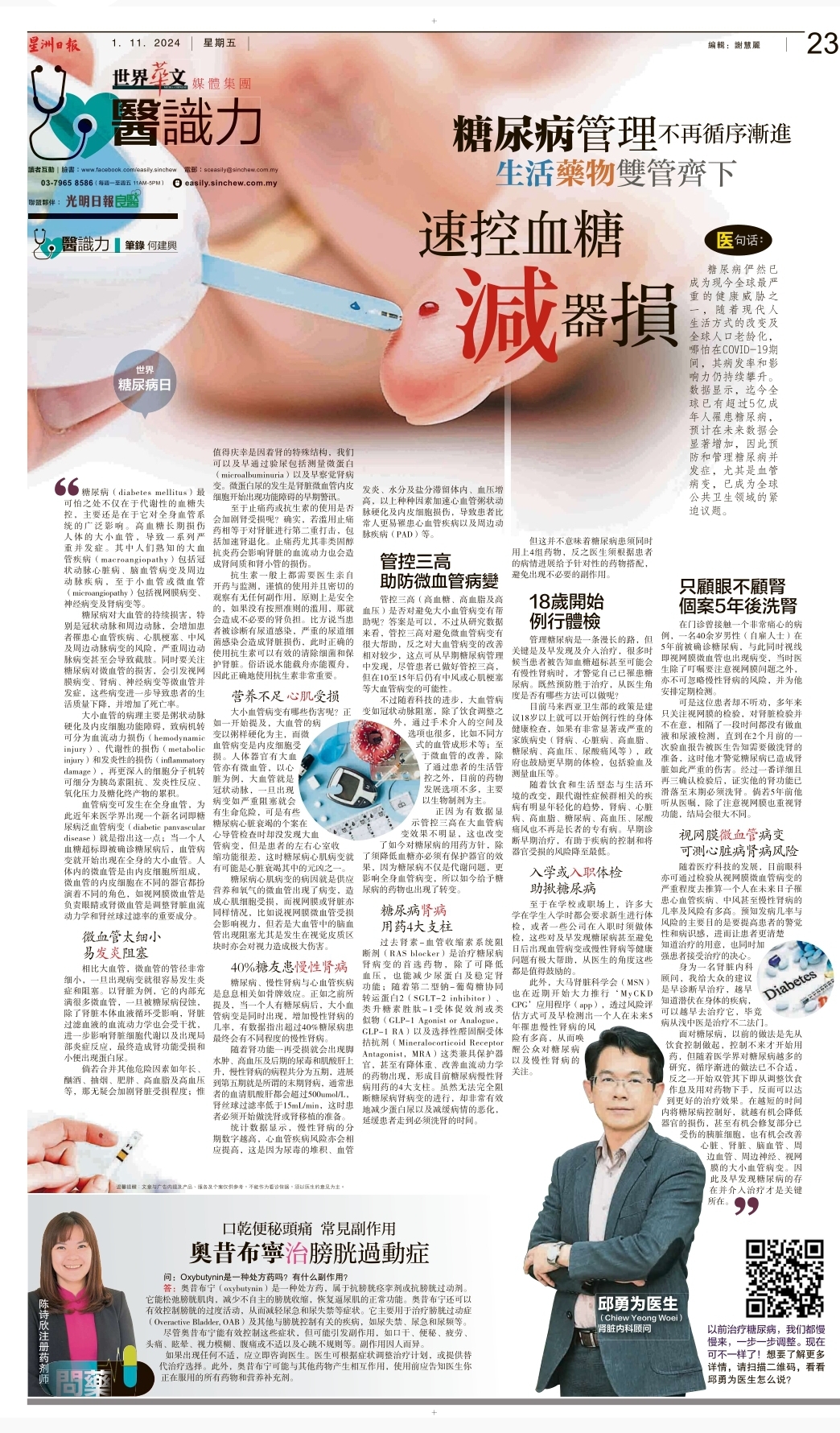Diabetes Management: Two-pronged Approach To Medication For Life, Rapid Glycemic Control And Reduction Of Organ Damage
01 November 2024

The most frightening aspect of diabetes mellitus is not only the metabolic loss of blood glucose control, but also its extensive effects on the systemic vascular system. Hyperglycemia chronically damages the body's large and small blood vessels, leading to a series of serious complications. The well-known macroangiopathy includes coronary heart disease, cerebrovascular disease and peripheral arterial disease, while the microangiopathy includes retinopathy, neuropathy and nephropathy.
 Consultant Internal Medicine & Nephrology, Sunway Medical Centre, Sunway City, Dr Chiew Yeong Woei says, vasculopathy can occur throughout the blood vessels of the body, and for this reason, in recent years, a new term has appeared in medical profession, namely diabetic panvascular disease.
Consultant Internal Medicine & Nephrology, Sunway Medical Centre, Sunway City, Dr Chiew Yeong Woei says, vasculopathy can occur throughout the blood vessels of the body, and for this reason, in recent years, a new term has appeared in medical profession, namely diabetic panvascular disease.
“When a person's blood glucose exceeds the standard, that is to say, after the diagnosis of diabetes mellitus, vasculopathy begins to appear in the large and small blood vessels of the whole body. The microvasculature in the body is composed of endothelial cells, which play different roles in different organs, such as retinal microvasculature or renal microvasculature.
“Compared with large blood vessels, microvessels have very small diameters and are prone to inflammation and obstruction once lesions occur. Take kidney as an example, it is full of microvessels, once affected by diabetes mellitus, the hemodynamics of the kidney filtering blood will also be interfered, which further affects the metabolism of the kidney cells, as well as the emergence of local inflammatory response, ultimately resulting in impaired renal function and proteinuria in urine,” he explained.
Whether the use of painkillers or antibiotics aggravate kidney damage, Dr Chiew says, the abuse of painkillers will affect the kidneys, including accelerating kidney degeneration.
He added, painkillers, especially non-steroidal anti-inflammatory drugs will affect the blood flow dynamics of the kidneys and cause damage to the renal interstitium and tubules.
He stated, diabetes, chronic kidney disease and cardiovascular disease are closely related as domino effect.
“When a person has diabetes, large and small vascular lesions occur at the same time, increasing the chances of chronic kidney disease, some data point out that more than 40% of diabetic patients will eventually have different degrees of chronic kidney disease.
“Statistics show that the higher the stage number of Chronic kidney disease (CKD), the higher the risk of cardiovascular disease. This is due to the accumulation of uremic toxins, inflammation of blood vessels, retention of water and salt in the body, and increased blood pressure, which accelerates the atherosclerosis of cardiovascular atherosclerosis and damage to endothelial cells, resulting in the patients being more susceptible to cardiovascular disease and peripheral arterial disease (PAD) than the general population,” he explained.
He added, with changes in diet, lifestyle and living environment, diseases related to metabolic syndrome have been significantly rejuvenated, and kidney disease, heart disease, high blood cholesterol, diabetes mellitus, high blood pressure, and uric acid gout are no longer the exclusive diseases of the elderly. Early diagnosis and treatment can help control the disease and minimize the risk of organ damage.
“My advice to the public is early diagnosis and early treatment, the earlier you know the disease lurking in the body, the earlier you can treat it,” he emphasized.
Source: Sin Chew Daily





